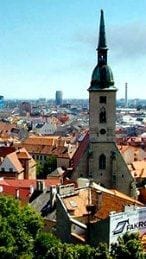A doctor’s advice to medical students
A doctor’s advice to medical students
It’s been six years since I graduated from internal medicine residency. Enough time to give me some perspective, but short enough to still remember the highs and lows vividly. I recently had the opportunity to talk with a bright and energetic group of medical students. (Really, though, is there any other kind?)
The conversation turned to any advice that I had or maybe I felt obligated to give some as part of the natural discourse between the novice and the survivor. These students were smart, so they already knew to work hard, get good grades, get into a good residency.
So I decided to be honest.
People die; it’s not a personal failure on your part. Our interventions and therapies can make disease more manageable and prolong life, but death will always be the ultimate and natural conclusion of our efforts.
Your choice of specialty will not determine your ultimate life happiness. You are not doomed to misery should you chose not to sub-specialize nor are you guaranteed happiness if you do. Choose something you enjoy, something in which the mundane doesn’t zap your will to live. Choose a specialty that provides a lifestyle congruent with your values. But don’t confuse intellectual intrigue with life happiness; there is so much more to the latter that has nothing to do with medicine.
Remember what it means to be a normal person. To retain a sense of awe in what you now get to do on a regular basis. To be able to explain things in non-medical terms the way you learned them before being indoctrinated. To feel — sadness, joy, grief, loss, elation. To remember the viewpoint of suffering.
Keep friends outside of medicine.You’ll be more human. And more interesting.
Guidelines are helpful, but they are not strict rules. Don’t try to meet every guideline while losing site of the big picture. You wouldn’t want your 95-year-old grandma on a high dose statin to prevent a heart attack “some day,” metformin for the elevated fasting glucose only apparent within the past year and three blood pressure pills that make her feel dizzy all the time to achieve some magic number that no one agrees on anyway. Don’t subject someone else’s grandma to that either.
Retain your humility. When family members say, “Something’s not right with Grandpa,” listen. They are usually right. Ask questions when you don’t know the answer. It can be especially humbling to do so in front of your colleagues, but your pride is no longer your priority, it is the best care of your patient.
Be kind in your comments about the “outside community doctor.” There is a high likelihood you will be that person at some point in your career. They usually aren’t as dense as you might think; they are just struggling to provide the same perfect care you are in a very imperfect system.
Burnout is inevitable. Plan for it. Write down what drew you to medicine in the first place and review on a regular basis. And then review some more.
Other services are not your enemy. Be kind when someone calls you with a “dumb consult”; you have likely called one yourself.
Avoid perpetuating the cycle of abuse. Just because you were demeaned and humiliated as a student or resident does not mean you are entitled to do the same to your younger colleagues. They are no more “unmotivated,” “lazy,” or “arrogant” then you were.
Think about how your orders affect your patient. How they may actually contribute to their suffering and discomfort. Nurses have been asking for us to do this for years; it’s time we took note.
Be mindful of the habits you cultivate. How you speak to patients, families, nurses. How you treat your family when you are stressed. Your eating habits, your spending habits, your sleep habits. These will follow you past residency, for better or for worse. Make sure they have been chosen with intention.
Medical training has likely put you in debt. Just because you have a big salary out of residency, doesn’t mean that you are wealthy. Wealth = assets – debts. Do the math and avoid the temptation to increase your debt further immediately on graduation with a huge new house, car or other toys. A few years of frugal living will pay dividends later on.
It doesn’t automatically get better after residency. Hate to break it to you, but it’s the truth. But it can be great if you prioritize what’s really important. Just pick those priorities carefully.
Authorized representatives of the most prestigious Universities in Slovakia, Hungary, The Czech Republic, Romania, Bulgaria, Austria and Serbia in Medicine, Dentistry, Pharmacy, Veterinary Medicine and in 180 more degree programs!
Study Medicine In Slovakia in English
Study Medicine, Dentistry, Veterinary Medicine, Pharmacy in Slovakia, Hungary, The Czech Republic, Romania, Bulgaria, Austria and Serbia

Slovakia officially the Slovak Republic is a country in Central Europe. It is bordered by the Czech Republic and Austria to the west, Poland to the north, Ukraine to the east and Hungary to the south. The capital and largest city is Bratislava.
Slovakia is a high-income advanced economy with one of the fastest growth rates in the European Union and the OECD. The country joined the European Union in 2004 and the Eurozone on 1 January 2009. Slovakia is also a member of the Schengen Area, NATO, the United Nations, the OECD and the WTO.
Study Medicine in Slovakia : Comenius Medicine University , Pavol Jozef Safárik University of Medicine , Jessenius University of Medicine
Study Dentistry in Slovakia : Comenius University of Dentistry , Pavol Jozef Safárik University of Dentistry
Study Veterinary Medicine in Slovakia : University of Veterinary Medicine in Kosice
Study Pharmacy in Slovakia : Comenius University of Pharmacy
Study Medicine In Bulgaria in English
Study Medicine, Dentistry, Veterinary Medicine, Pharmacy in Slovakia, Hungary, The Czech Republic, Romania, Bulgaria, Austria and Serbia

Bulgaria officially the Republic of Bulgaria is a country in southeastern Europe.
It is a member of the European Union, NATO, and the Council of Europe; a founding state of the Organization for Security and Co-operation in Europe (OSCE); and has taken a seat at the UN Security Council three times.
Study Medicine in Bulgaria in English : University of Medicine in Varna , University of Medicine in Sofia , University of Medicine in Plovdiv , St. Kliment Ohridski Medical University in Sofia
Study Dentistry in Bulgaria in English : University of Dentistry in Sofia , University of Dentistry in Varna , Plovdiv Medical University of Dentistry
Study Veterinary Medicine in Bulgaria in English : Veterinary Medicine in Sofia , Veterinary Medicine in Stara Zagora
Other Fields of Study in Bulgaria in English : Nurse Studies , Midwife Studies , Naval Academy
Study Medicine In Romania in English
Study Medicine, Dentistry, Veterinary Medicine, Pharmacy in Slovakia, Hungary, The Czech Republic, Romania, Bulgaria, Austria and Serbia

Romania is the seventh most populous member state of the European Union. Its capital and largest city, Bucharest, is the sixth largest city in the EU.
It has been a member of NATO since 2004, and part of the European Union since 2007. Around 90% of the population identify themselves as Eastern Orthodox Christians, and are native speakers of Romanian. With a rich cultural history, Romania has been the home of influential artists, musicians, inventors and sportsmen, and features a variety of tourist attractions.
Study Medicine in Romania : Gr. T. Popa University of Medicine, Carol Davila University of Medicine, Iuliu Hațieganu Medicine University, Ovidius University of Medicine
Study Dentistry in Romania : Gr. T. Popa University of Dentistry, Luliu Hațieganu University of Dentistry
Study Veterinary Medicine in Romania : University of Veterinary Medicine in Cluj Napoka
Study Pharmacy in Romania : Gr. T. Popa University of Pharmacy, Luliu Hațieganu University of Pharmacy
Study Medicine In Austria in German
Study Medicine, Dentistry, Veterinary Medicine, Pharmacy in Slovakia, Hungary, The Czech Republic, Romania, Bulgaria, Austria and Serbia

Austria officially the Republic of Austria, is a federal republic and a landlocked country of over 8.5 million people inCentral Europe. The majority of the population speak local Bavarian dialects of German as their native language, and Austrian German in its standard form is the country’s official language.
Austria is one of the richest countries in the world. The country has developed a high standard of living and in 2014 was ranked 21st in the world for its Human Development Index. Austria has been a member of the United Nations since 1955, joined the European Union in 1995, and is a founder of the OECD. Austria also signed the Schengen Agreement in 1995 and adopted the European currency, the Euro, in 1999.
Study Medicine in Austria in German : Medical University of Vienna
Study Dentistry in Austria in German : Medical University of Dentistry
Study Pharmacy in Austria in German : University of Pharmacy
Study Veterinary Medicine in Austria in German : University of Veterinary Medicine
180 More Degree Programs: University of Vienna
Study Medicine In The Czech Republic in English
Study Medicine, Dentistry, Veterinary Medicine, Pharmacy in Slovakia, Hungary, The Czech Republic, Romania, Bulgaria, Austria and Serbia

The Czech Republic is a landlocked country in Central Europe bordered by Germany to the west, Austria to the south, Slovakia to the east and Poland to the northeast. The capital and largest city, Prague, has over 1.2 million residents.
The Czech Republic also ranks as the 11th most peaceful country, while achieving strong performance in democratic governance. It is a member of the United Nations, the European Union, NATO, the OECD, the OSCEand the Council of Europe.
Study Pharmaceutical Sciences in The Czech Republic : University of Pharmaceutical Sciences
Study Veterinary Medicine in The Czech Republic : University of Veterinary Medicine
Study Life Sciences in The Czech Republic : Czech University of Life Sciences in Prague
Study Medicine In Hungary in English
Study Medicine, Dentistry, Veterinary Medicine, Pharmacy in Slovakia, Hungary, The Czech Republic, Romania, Bulgaria, Austria and Serbia

Hungary formally, until 2012, the Republic of Hungary is a landlocked country in Central Europe. The country’s capital and largest city is Budapest. Hungary is a member of the European Union, NATO, the OECD, the Visegrád Group, and the Schengen Area. The official language is Hungarian, which is the most widely spoken non-Indo-European language in Europe.
Study Medicine in Hungary : Semmelweis University of Medicine , University of Medicine in Szeged , University of Medicine in Pecs
Study Dentistry in Hungary : Semmelweis University of Dentistry , University of Dentistry in Szeged , University of Dentistry in Pecs
Study Medicine In Serbia in English
Study Medicine, Dentistry, Veterinary Medicine, Pharmacy in Slovakia, Hungary, The Czech Republic, Romania, Bulgaria, Austria and Serbia

Serbia, officially the Republic of Serbia is a sovereign state situated at the crossroads between Central and Southeast Europe.
Serbia is a member of the UN, CoE, OSCE, PfP, BSEC, and CEFTA. It is also an official candidate for membership in the European Union which is negotiating its EU accession, acceding country to the WTO and is a militarily neutral state.
Study Medicine in Serbia : University of Medicine in Novi Sad
Study Dentistry in Serbia : University of Dentistry in Novi Sad
Study Pharmacy in Serbia : University of Pharmacy in Novi Sad



